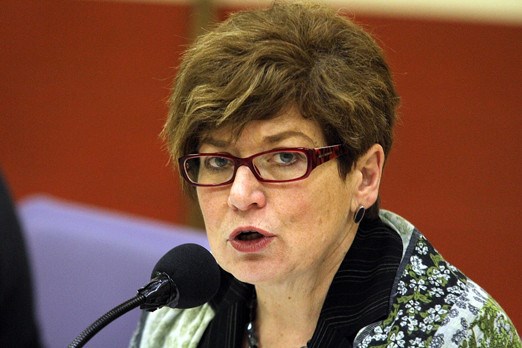Iain Angus says Ontario’s mounting deficit should not lead to knee-jerk spending cuts to public services.
Angus on Monday was the first of about two dozen presenters sharing their thoughts with Judy Waylycia-Leis, the commissioner of the Public Services Foundation of Canada Commission on Quality Public Services and Tax Fairness.
Angus said during lean times, governments spend and build deficits, which in turn are paid off when more prosperous economies emerge.
“Families do that too. In hard times they borrow, they use their credit cards and they slowly work to pay them off to a timetable that makes sense for them, rather than an arbitrary one of let’s do it in five years,” Angus said.
“The main message is that public services are there because people want them and governments have responsibilities to find ways in which to deliver them at the most appropriate cost to the taxpayers.”
He went on to say taxpayers don’t mind paying taxes, as long as they feel they are getting good value for their dollar.
“It’s when they feel they’re getting ripped off that they get upset,” said Angus, who last week stepped down after five years as chairman of the Thunder Bay District Social Services Administrative Board.
Trish Hennessey of the Canadian Centre for Policy Initiatives said there was a big difference between the recession of the early- to mid-1990s and the one Ontarians have recently emerged from.
Back then, downsizing the public sector was the word of the day, said Hennessey.
Golden handshakes were supposed to lead toearly retirement for those who walked away from high-paying government jobs and job protection for those left behind, but it didn’t work out that way.
All it led to was higher unemployment. Then, when the economy surged, governments of the day offered up a steady stream of tax cuts, only to have the financial meltdown of 2008 go viral.
It’s exacerbated the income inequality gap, she said, which in Canada is starting to approach dangerous levels, mimicking that of the United States.
“Income equality is a conversation we should be having, not austerity,” Hennessey said.
The reaction in the ‘90s is a lot like what she’s seeing bandied about today, and it has her worried for a middle class she said is under stress and under siege.
“It’s shrinking because we never really addressed the problem that we ignored in the 1990s, which was unemployment and how you create jobs in a globalized market.”
Waylycia-Leis, making her sixth stop on a cross-province tour, said the purpose of the commission is to collect information from the providing public services and put together a report that will provide a bit of guidance to Queen’s Park as they attempt to become more fiscally prudent, while ensuring the public has the services it needs.
The response has been overwhelming, she said.
“They are deeply concerned about cuts in public services that may affect the quality of life in their communities, the jobs that are available and the opportunities for people who are most vulnerable,” she said.
Her tour comes in the midst of economist Don Drummond’s forthcoming report that is expected to recommend sweeping changes to the public service, including the consolidation of ministries, a revamp in health care, higher beer and wine prices and suggestions for ways the Ontario government can slash a deficit that’s costing taxpayers a reported $10 billion a year in interest payments alone.
“I think people are very concerned that we could cut off our nose to spite our face,” Waylycia-Leis said, “in fact, with so much emphasis on cutting the government’s budget and end up with no economic growth and a deeper recession than ever.
“It is about finding that balance and what’s an appropriate debt-to-GDP ratio and what levels of services are required for community living – and how can we actually contribute to economic growth to counter the worst effects of the recession.”
A public session was held Monday evening at the Lakehead Labour Centre starting at 7 p.m.
Follow Leith Dunick on Twitter: @leithdunick
